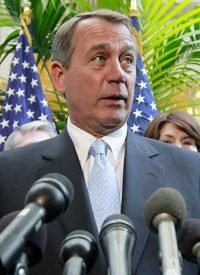
So dismayed and disappointed are the Tea Party faithful that dispatches from the various Tea Party outposts suggest that the movement will back a challenger to Boehner in the 2012 elections.
Witness the following comment from Michael Snyder of the American Dream, who insisted that if the Tea Party is to retain its credibility and maintain its political potency, then “they must hold John Boehner accountable and go after his seat during the next primary season.”
Mark Meckler of the Tea Party Patriots put it this way: “If John Boehner really thinks there’s no daylight between him and the Tea Party, he’s not looking.”
While Speaker Boehner may not take seriously the threat of a Tea Party-supported attempt to wrest his district from him (and thus his power), some pundits propose that the racket of rebellion will weaken Boehner immediately and will discourage Democrats from being so eager to compromise, as they will sense his vulnerability and prey upon it.
As the leader of the Republican party in the House, Boehner is the focus of the Tea Party rage, and his days as Speaker may be numbered, but other rank and file lawmakers shouldn’t be asking for whom the bell tolls.
Another Tea Party bigwig, Mark Meckler, reckons that the compromises made by freshmen Republican representatives will combine to create a poisonous cocktail that will prematurely end the political career of many newly elected legislators who came to Capitol Hill on the Tea Party train, promising to stand up to the spenders and give no quarter to those intent on perpetuating the status quo.
A story in The Hill indicates that these first-timers aren’t frightened by the specter of Tea Party retribution. “It’s not that I’m not worried about them. And I would like to be all things to all people, but if you try to do that, you’re nothing to anybody. So I’m more inclined to just vote yes and move this in the right direction,” Congressman Mike Kelly (R-Penn.) told the online publication.
While reports of disaffection percolating up from the grassroots of the Tea Party are abundant, Kelly claims to have heard nothing negative from his constituents.
“I have to tell you, I’m not getting that negative feedback about this [budget] agreement. I’m really not,” the Congressman said.
The discrepancy in the extent and fervor of the dissatisfaction of the electorate is easily explained away. To voters, particularly Tea Party-affiliated voters, this crop of freshmen lawmakers are perceived to have broken their campaign vows to reduce government and break the cycle of deficit increases. Their erstwhile supporters feel betrayed and used. Many feel that these candidates who at one time drew near them with their lips, had their hearts far from them once they started breathing the self-congratulating and incumbent-friendly atmosphere of Washington, D.C.
For their part, the newly minted lawmakers, cognizant of the inherent power of incumbency and filtered by distance and distraction from the singeing crackles and pops of the fires of opposition, began to establish themselves as independent entities, unfettered by and not beholden to any person or group of people. As has been explained before, the loss of short-term memory is one of the earliest symptoms of Potomac Fever.
As news of their ignominy among those who once praised their names and erected signs with the same in their front yards seeps into the consciousness of these Congressmen, they have felt obliged to strike a defiant and independent pose, alienating their base in the process.
“As much of a fiscal conservative as I am, you do have to accept the small victory sometimes before you get to the bigger victory,” said Representative Michael Grimm (R-N.Y.).
Apparently, Congressman Grimm sees the budget compromise as a type of victory, albeit a small one, and therein lies the kernel of the dissension.
Tea Party activists back home seem not to share their representative’s opinion of the budget deal. Rather, they consider the deal a calculated deception and are committed to repay this treachery at the ballot box next year.
Photo of John Boehner: AP Images



